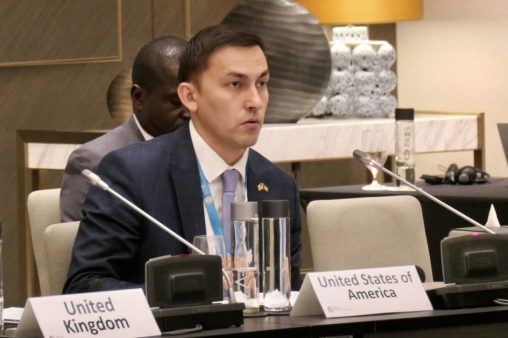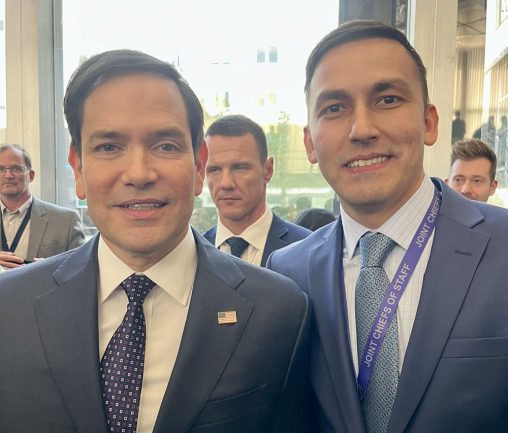
Wright State alum Iskandar Atajanow serves on a commission that seeks to repatriate remains of Iraqis and Kuwaitis missing during the Gulf War.
Iskandar Atajanow is putting the business degree he earned from Wright State University to use in an unusual and humanitarian way.
Atajanow is a U.S. diplomat with the American embassy in Kuwait, serving on a commission that seeks to repatriate remains of Iraqis and Kuwaitis missing during the Gulf War from August 1990 to February 1991.
Atajanow’s early life and link to the U.S. Department of State foreshadowed his current posting. He was born in Tajikistan, a small country in Central Asia surrounded by Afghanistan, China, Kyrgyzstan and Uzbekistan. He applied to attend high school in the United States through the State Department’s Future Leaders Exchange Program.
The program seeks to build relationships with post-Soviet Union nations, such as his homeland. The application process was fiercely competitive, he recalled. He was selected, moving in 2007 to Centerville, where he completed high school.
After graduation in 2008, he joined the U.S. Army and was assigned to a Special Operations command. He became a soldier of the year and was admitted to an Army Reserve Officers’ Training Corps program. He was on active duty from 2009 to 2011.
“Dayton became close to my heart, and I wanted to go to Wright State,” he said.
He enrolled in Wright State’s Raj Soin College of Business, earning a bachelor’s degree in business in 2013. He earned his degree in fewer than four years because of his Army service.
“Wright State really, truly gets it,” he said of how the university accommodates those with military service.
After graduating from Wright State, he was attached to the State Department as a diplomat in the Middle East. He successfully applied for a fellowship, earned a master’s degree from Columbia University’s School of International and Public Affairs, joined the foreign service and was posted to Kuwait.
For the last year and a half, he has served on the Iraq-Kuwait Tripartite Commission, formed in the aftermath of the Gulf War to find the remains of those lost in the conflict.
The purpose of the commission is humanitarian, he said.
“It’s important to get the remains of Kuwaitis to Kuwait, Iraqis to Iraq,” Atajanow said. “For people missing loved ones, it’s important to bring closure — bringing bodies to where they should be.”
He said still missing are about 300 Kuwaitis, 700 Iraqis and several from Saudi Arabia, which was one of the allies in the U.S.-led military effort against Iraq’s invasion of Kuwait. Atajanow said all the remains of U.S. personnel have been recovered.
The commission utilizes several tools, such as satellite images to find burial sites. It continues to rely on witnesses to come forward with knowledge of potential graves.
“We rely heavily on witnesses,” Atajanow said. “Witnesses are the best way to find those remains.”
He made a personal appeal to readers who were in the war and saw any evidence of burials to contact the International Committee of the Red Cross at jnamek@icrc.org.
Atajanow will be in Kuwait for about another six months and then will rotate to another diplomatic assignment. He wants to serve at an embassy, where through interacting with so many different cultures “you can build those bridges with people and promote U.S. foreign policy and help humanitarian causes — some of those are the most beautiful parts of the job.”
In the it’s a-small-world-department, Atajanow came across another Wright State alum in his work.
He has been collaborating with Ambassador Rabea Saad Al-Adsani, Kuwait’s assistant foreign minister for missing persons affairs, who leads the Kuwaiti delegation to the commission.
“I discovered that he’s also a Wright State alumnus, class of 1988 in computer engineering,” Atajanow said. “We had a great time reminiscing about Wright State and talking about our shared experiences.”
As for his experience as a Raider, Atajanow said, “Wright State helped me academically find myself. It left an impact on me as a person, a professional and as an academic. I’m proud of Wright State.”


 Wright State names Rajneesh Suri dean of Raj Soin College of Business
Wright State names Rajneesh Suri dean of Raj Soin College of Business  ‘Only in New York,’ born at Wright State
‘Only in New York,’ born at Wright State  Wright State president, Horizon League leaders welcome new commissioner
Wright State president, Horizon League leaders welcome new commissioner  Wright State celebrates homecoming with week-long block party
Wright State celebrates homecoming with week-long block party  Wright State baseball to take on Dayton Flyers at Day Air Ballpark April 15
Wright State baseball to take on Dayton Flyers at Day Air Ballpark April 15 